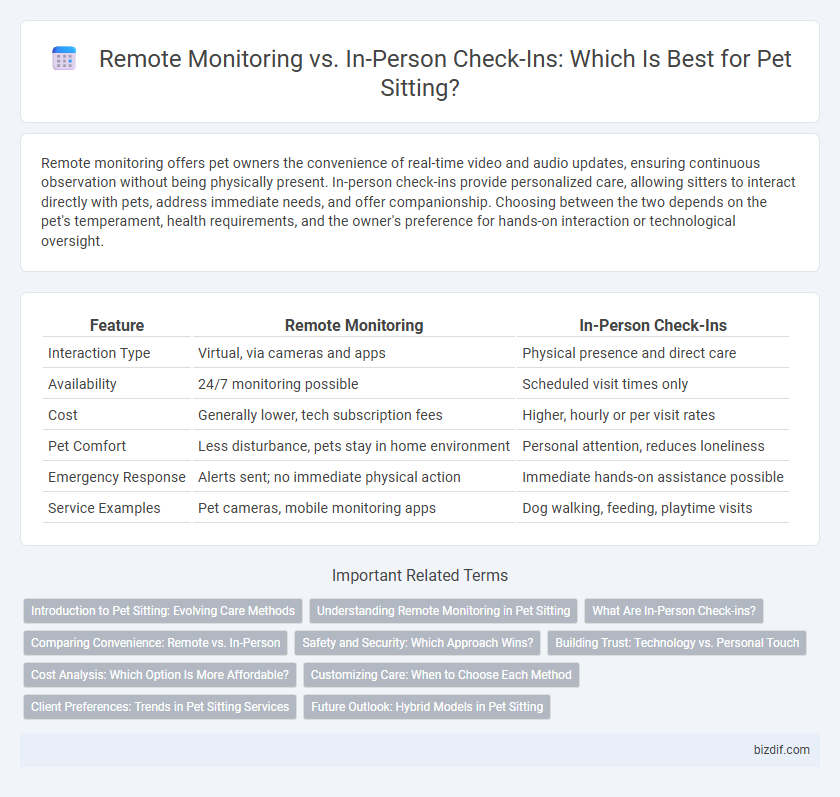Remote monitoring offers pet owners the convenience of real-time video and audio updates, ensuring continuous observation without being physically present. In-person check-ins provide personalized care, allowing sitters to interact directly with pets, address immediate needs, and offer companionship. Choosing between the two depends on the pet's temperament, health requirements, and the owner's preference for hands-on interaction or technological oversight.
Table of Comparison
| Feature | Remote Monitoring | In-Person Check-Ins |
|---|---|---|
| Interaction Type | Virtual, via cameras and apps | Physical presence and direct care |
| Availability | 24/7 monitoring possible | Scheduled visit times only |
| Cost | Generally lower, tech subscription fees | Higher, hourly or per visit rates |
| Pet Comfort | Less disturbance, pets stay in home environment | Personal attention, reduces loneliness |
| Emergency Response | Alerts sent; no immediate physical action | Immediate hands-on assistance possible |
| Service Examples | Pet cameras, mobile monitoring apps | Dog walking, feeding, playtime visits |
Introduction to Pet Sitting: Evolving Care Methods
Remote monitoring in pet sitting leverages technology such as video cameras and apps to provide real-time oversight, allowing pet owners to stay connected and ensure their pets' well-being from a distance. In-person check-ins, however, offer hands-on interaction, enabling caregivers to assess pets' physical and emotional needs directly, which is crucial for animals requiring personalized attention. Combining these methods optimizes pet care by balancing convenience with the intimacy of human presence, reflecting the evolving trends in pet sitting services.
Understanding Remote Monitoring in Pet Sitting
Remote monitoring in pet sitting uses cameras and sensors to track pets' behavior, activity, and environment in real-time, allowing pet owners to receive live updates and alerts via mobile apps. This technology helps ensure pets' safety and comfort without the need for a sitter's physical presence, ideal for short-term supervision or pets that are comfortable alone. While in-person check-ins offer hands-on care and emotional interaction, remote monitoring provides continuous, convenient oversight leveraging smart devices and internet connectivity.
What Are In-Person Check-ins?
In-person check-ins involve a pet sitter visiting the pet's home to provide hands-on care, including feeding, exercising, and monitoring the pet's well-being. This method allows for direct observation of the pet's behavior and environment, ensuring immediate attention to any health or safety concerns. In-person check-ins offer personalized interaction and comfort, which often leads to better pet stress reduction compared to remote monitoring.
Comparing Convenience: Remote vs. In-Person
Remote monitoring offers unparalleled convenience by allowing pet owners to check on their pets anytime via smartphone apps, eliminating travel time and enabling real-time interaction. In-person check-ins provide hands-on care and social interaction that technology cannot replicate, ensuring pets receive personalized attention and immediate responses to their needs. While remote monitoring excels in accessibility and continuous observation, in-person visits deliver comprehensive care through direct human presence and physical engagement.
Safety and Security: Which Approach Wins?
Remote monitoring offers continuous surveillance through high-definition cameras and real-time alerts, enhancing pet safety by instantly detecting unusual behavior or emergencies. In-person check-ins provide direct interaction, allowing caregivers to assess a pet's condition, environment, and emotional state more accurately, reducing risks associated with delayed responses. Combining remote monitoring with scheduled in-person visits often delivers the highest level of safety and security for pets.
Building Trust: Technology vs. Personal Touch
Remote monitoring offers pet owners real-time updates and video access, enhancing transparency and reassurance through technology. In-person check-ins provide a personal touch, fostering trust by allowing direct interaction and observation of pets' behavior and environment. Combining both methods maximizes trust, blending digital oversight with human connection for comprehensive pet care.
Cost Analysis: Which Option Is More Affordable?
Remote monitoring for pet sitting typically incurs lower costs due to reduced travel expenses and minimal time commitment from caregivers, making it a budget-friendly choice. In-person check-ins, however, involve higher fees reflecting the caregiver's travel time and physical presence, which can increase overall costs. Evaluating frequency and specific pet needs helps determine which option offers more affordable and value-driven care.
Customizing Care: When to Choose Each Method
Customizing pet care involves weighing remote monitoring against in-person check-ins based on the pet's health, behavior, and owner preferences. Remote monitoring suits pets with stable conditions and owners seeking convenience through real-time video updates and activity tracking. In-person check-ins are essential for pets requiring hands-on care, medication administration, or those prone to anxiety and behavioral issues.
Client Preferences: Trends in Pet Sitting Services
Client preferences in pet sitting services increasingly favor remote monitoring technology, offering real-time video and activity tracking that enhances peace of mind and convenience. However, in-person check-ins remain popular for pets requiring personalized interaction, medical care, or complex routines, appealing to clients valuing direct human connection. Hybrid models combining both approaches are emerging, catering to diverse needs and maximizing pet wellbeing while addressing modern lifestyle demands.
Future Outlook: Hybrid Models in Pet Sitting
Hybrid models in pet sitting combine remote monitoring technology with traditional in-person check-ins, enhancing pet care efficiency and responsiveness. Advances in smart cameras, wearable pet trackers, and real-time communication apps allow sitters to monitor pets continuously while providing essential physical interaction. This integrated approach is poised to become the industry standard, offering pet owners peace of mind through comprehensive, technology-enhanced care solutions.
Remote monitoring vs In-person check-ins Infographic

 bizdif.com
bizdif.com